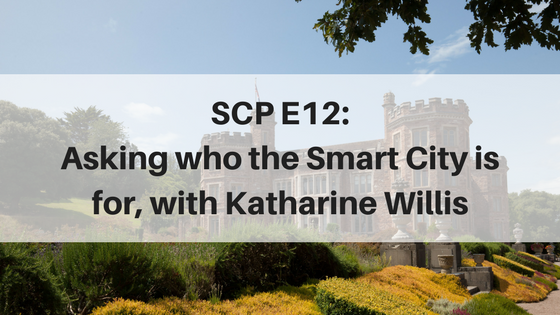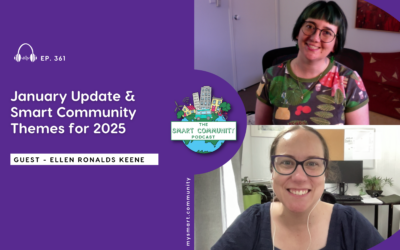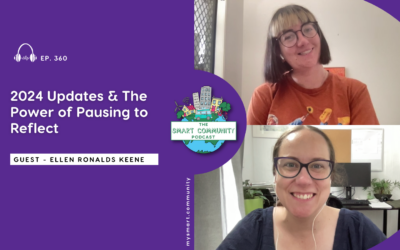In this episode of the Smart City Podcast, I had a really thought-provoking conversation with Katharine Willis about who the Smart City is for. Katharine is an architect and Associate Professor at Plymouth University and initially was reluctant to get involved in the Smart City space. She continues to challenge commercially driven initiatives and focus on what the people actually think about so-called Smart Cities. We discussed Plymouth’s new Masters in Smart Urban Futures, and also a number of projects that Katharine researched about who was included and actively excluded in Smart City planning and implementation around the world. We also talked about how some fo the Smartest places in the world are in the regional and rural areas.
Disclaimer: Everything discussed is personal opinion only and does not represent the companies we work for or associated in any way with these companies.
Listen here:
What we cover in this episode:
- Katharine’s background in architecture and design and the societal aspect of it
- The expanding field of architecture that designs for not just brick and mortar spaces but also digital spaces
- What sparked Katharine’s interest in Smart Cities and the questions she asks about the Smart Cities movement
- What the Masters in Smart Urban Futures at Plymouth University offers
- Katharine’s research into how Smart Cities can provide benefit to marginalised communities
- The problem of Smart Cities excluding certain groups and only including and benefiting certain people
- What’s happening in some cities around the world, including in India and Brazil, and how we need to empower people locally to use Smart City in their neighbourhoods
- The best approaches to Smart Cities that Katharine saw in the UK
- The reason it’s important to aim for realistic rates of change in all cities, including Smart Cities and why
- How pilots of Smart tech should be working with communities to implement projects
- The importance of planning for the maintenance of Smart initiatives so they don’t become underfunded and then unused long term
- Why the joined up approach and Living Labs helps create management scale by working with communities rather than working at the city level
- The need for long term funding to ensure the ongoing, sustainable change of Smart communities
- The fundamental flaw Katharine sees in the competitive business style marketing of cities approach in the Smart Cities conversation around the world
- The need to think beyond the global city and instead focus at the local level and the rural or regional areas
- What Katharine thinks we’re not talking about in the Smart City space and why we need to get beyond the glossy marketing and down to the practical level
Quotes:
“Having worked in the area of looking at digital technologies and cities for a long time, when [the term] Smart Cities came along I was initially quite reluctant to get engaged with having a discussion because it’s quite techno-centric and not really thinking about [people]. Although it argues it’s about how people inhabit cities, a lot of it is selling tech to deliver solutions for cities.
“Is the way that we’re looking at Smart Cities right? Should we be thinking about more nuanced ways? Should we be thinking about what people actually think? getting Smart Cities has been discussed as a very citizen-centric, bottom up way, but a lot of the ways it’s delivered is not that.”
“If you look at any large-scale Smart City project, what you’ll see is a rationale that says cities are failing and are a problem…But we actually think that cities are not a problem, they are a solution. There’s lots of people, they are messy and they are complicated, and we don’t need technology to solve those solutions, we need technology to help people to do things they’re already doing maybe better or in different ways.”
“Actually Smart can be very low cost and local.”
“The main one is that they’re generally the ones that have failed because they have promised things that they can’t deliver. There’s a lot of Smart Cities projects that promise a lot of large-scale, fairly quick change in the city and that’s just not realistic…Technology as a fix for a problem that we have, is a poor way to think about it and that’s generally where we’ve seen things have failed.”
“One of the challenges with Smart City is when you ask anybody about it there’s a different answer depending on who you speak to. So just establishing a common ground initially about what you all agree Smart is and what you want to achieve with it is a really good approach.”
Links:
- MA Smart Urban Futures https://www.plymouth.ac.uk/courses/postgraduate/ma-smart-urban-futures
- AHRC Whose Smart City Network www.whosesmartcity.net @whosesmartcity
- Connected Seeds Project, London http://www.connectedseeds.org/
- Design for Social Change www.d4sc.io
- Crowdfund Plymouth https://www.crowdfunder.co.uk/crowdfund-plymouth
- Dataplay Plymouth https://www.plymouth.gov.uk/dataplay
- Open Data Institute Devon http://devon.theodi.org/
Connect with Katharine:
Get in touch with Katharine on Twitter @trolleytweet or visit plymouth.ac.uk to find more about the Masters of Smart Urban Futures
Connect with Zoe:
Connect with me via email: hello@mysmart.community
Connect with My Smart Community via LinkedIn or Twitter and watch on YouTube
Podcast Production by Perk Digital






0 Comments